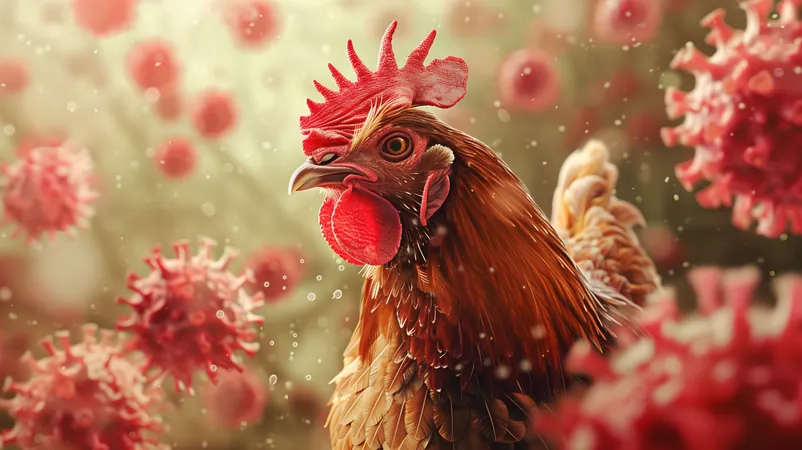
Moderna Secures $590 Million to Combat Avian Flu with Cutting-Edge Vaccine Technologies
2025-01-21
Author: Li
Introduction
In a significant move to bolster pandemic preparedness, the Department of Health and Human Services (HHS) has announced a funding award of approximately $590 million to Moderna. This investment aims to expedite the development of mRNA-based vaccines targeting avian influenza strains, ensuring that the United States is better equipped to handle future health crises.
Avian Flu Strains
Among the primary avian flu strains under scrutiny are H5N1 and H7N9. The H5N1 strain, which has been prevalent among wild birds and recently in poultry, poses a growing concern following outbreaks that have affected livestock in the U.S. Alarmingly, the Centers for Disease Control and Prevention (CDC) reported 67 confirmed human cases of H5N1 transmission since 2022, with one fatality recorded. The majority of these cases emerged in 2024, highlighting the strain’s potential for concern. However, officials stress that the risk of human-to-human transmission remains low, while urging hospitals to proactively test and subtype all influenza A specimens from hospitalized patients.
Moderna’s Clinical Trials
In an exciting development, Moderna has already initiated a phase 1/2 clinical trial to assess the safety and immune response of its investigational mRNA-based influenza vaccine (designated mRNA-1018) in healthy adults aged 18 and older. This trial includes candidates aimed at the H5 and H7 strains. Preliminary data from this study has shown promise, prompting Moderna to gear up for a phase 3 trial. If successful, mRNA-1018 could become the first approved vaccine specifically for the H5N1 strain. The disease caused by H7N9, which was first identified in China in 2013, remains a crucial target for vaccination efforts.
Innovative mRNA Technology
Utilizing their renowned mRNA technology, which played a pivotal role in developing vaccines against COVID-19 and RSV, Moderna’s innovative approach does not involve live viruses. Instead, the mRNA instructs cells to produce proteins that initiate an immune response, offering a novel avenue for combating infectious diseases.
Official Statements
Former HHS Secretary Xavier Becerra emphasized the urgency of addressing avian flu variants, noting their historical unpredictability and threat to human health. “Accelerating the development of new vaccines will allow us to stay ahead and ensure that Americans have the tools they need to stay safe,” he stated.
Future Plans
In addition to this funding, Moderna plans to design and develop up to four additional pandemic influenza vaccines, with safety and efficacy being verified through phase 1 studies.
Funding Source
This substantial award was made possible through the Rapid Response Partnership Vehicle Consortium, financed by the Biomedical Advanced Research and Development Authority, which is part of the HHS Administration for Strategic Preparedness and Response.
Conclusion
With increasing concerns around emerging infectious diseases, this funding could pave the way for a stronger vaccination framework, safeguarding public health against the unpredictable nature of avian influenza and other potential pandemics. Stay tuned for more updates as Moderna progresses with its groundbreaking research!


 Brasil (PT)
Brasil (PT)
 Canada (EN)
Canada (EN)
 Chile (ES)
Chile (ES)
 Česko (CS)
Česko (CS)
 대한민국 (KO)
대한민국 (KO)
 España (ES)
España (ES)
 France (FR)
France (FR)
 Hong Kong (EN)
Hong Kong (EN)
 Italia (IT)
Italia (IT)
 日本 (JA)
日本 (JA)
 Magyarország (HU)
Magyarország (HU)
 Norge (NO)
Norge (NO)
 Polska (PL)
Polska (PL)
 Schweiz (DE)
Schweiz (DE)
 Singapore (EN)
Singapore (EN)
 Sverige (SV)
Sverige (SV)
 Suomi (FI)
Suomi (FI)
 Türkiye (TR)
Türkiye (TR)
 الإمارات العربية المتحدة (AR)
الإمارات العربية المتحدة (AR)